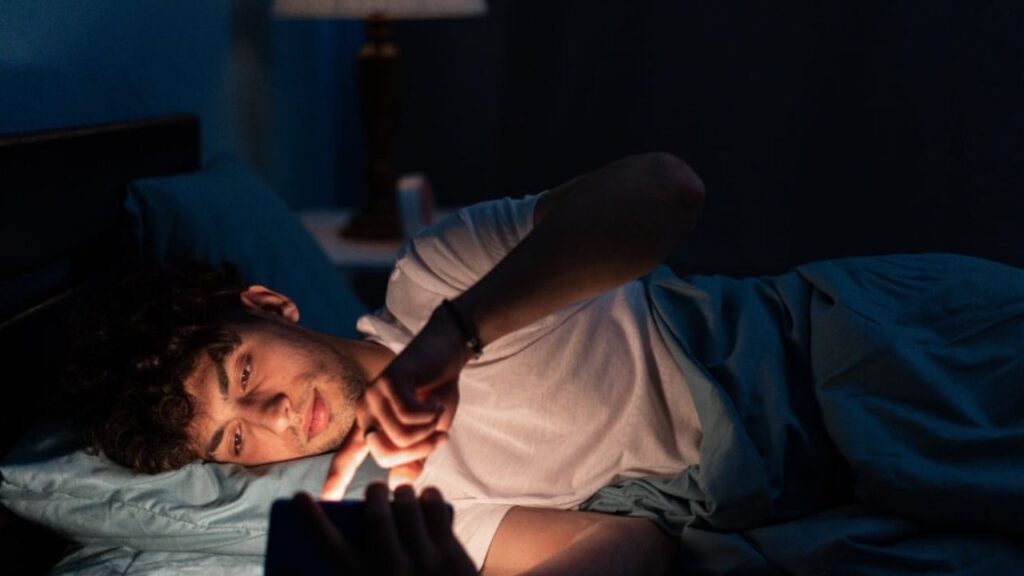INTRODUCTION
If you also want to understand how does screen time affect your physical and mental health. and how you can avoid this problem, then this article is a must-read for you.
In today’s digital age, screen has become an important part of our daily life. As soon as we open our eyes in the morning, we pick up the phone first, and we also look at the screen before going to sleep at night.

Be it work or entertainment, online shopping or study – screen is necessary for every work. But the question that arises is how does screen time affect your physical and mental health.
Excessive screen time may seem harmless, but slowly it can become a silent enemy of your health. Body pain, sleep problems, eye troubles, and mental stress — all are linked to one root cause: excessive screen exposure.
In this article, we will deeply explore how screen time affects your body and mind
PHYSICAL HEALTH EFFECTS OF SCREEN TIME
These days, excessive screen use is not just a habit, it has become a serious health concern. Here are some major physical health problems that tell us how does screen time affect your physical and mental health. Especially the functioning of your body:

1. Eye Strain (Digital Eye Fatigue)
- Symptom: Burning in the eyes, dryness, blurry vision, and headache.
- Reason: Continuously watching the screen without a break exhausts the eye muscles.
- Solution: Use the 20-20-20 Rule — every 20 minutes look 20 feet away for 20 seconds
2. Poor Posture (Tech Neck & Back Pain)
- Symptom: slouching neck, slouched back, and chronic neck pain.
- Cause: Bad body posture while using mobile or laptop.
- Result: Spinal alignment can get damaged in the long term, and the body feels stiff.
3. Weight Gain & Obesity
- Reason: More screen time = sedentary lifestyle = less movement = less calorie burn.
- Impact: Fat accumulation occurs, metabolism slows down, and the risk of obesity increases.
- Note: Sitting for long hours in front of screens directly contributes to physical inactivity.
4. Sleep Disruption
- Blue Light Effect: The blue light of the screen suppresses the melatonin hormone.
- Impact: Sleep comes late, is disturbed, and one feels tired after waking up in the morning.
- Conclusion: Bedtime screen use should be minimized to restore the natural sleep cycle.
5. Headaches & Migraines
- Cause: Eye fatigue + screen flicker + poor posture = continuous strain on neck and brain.
- Result: Frequent headaches or migraines which worsen after screen exposure.
6. Hand & Wrist Pain (Texting Thumb / Mouse Hand)
- Worse: Phones and computers cause repetitive motion injuries.
- Common conditions: Carpal tunnel syndrome and thumb inflammation.
All these problems clearly show how does screen time affect your physical and mental health. And specifically what problems it creates in the body. If you want to maintain physical fitness, it is very important to control screen exposure.
MENTAL HEALTH EFFECTS OF SCREEN TIME
Excessive screen time not only damages your body, but also silently damages your brain. These problems develop slowly and have a very deep impact on mental health.

1. Anxiety & Stress Increase
- Cause: All the time notifications, messages, and content overload.
- Effect: The brain is constantly active, as a result of which the stress hormone (cortisol) increases.
- Signs: Fear, restlessness, negative thoughts, and burnout.
2. Attention span becomes short
- Reason: Reels, short videos, and fast content give instant dopamine to the brain.
- Impact: Long-form content or deep focus work starts to seem boring.
- Result: Concentration in work decreases, and productivity drops.
3. Mood Swings & Irritability
- Digital Overstimulation: The brain never gets any rest, which leads to emotional imbalance.
- Effect: Anger over small things, irritability, and being off mood become common.
4. Social Media Comparison = Low Self-Esteem
- Issue: Seeing the filtered life of others makes your life seem worthless.
- Result: Self-doubt, insecurity, and loss of confidence begin.
- Mental Pressure: The stress of looking perfect all the time develops.
5. Screen Addiction (Digital Dependence)
- Warning Signs: Unlocking the phone every 5-10 minutes, scrolling without reason.
- Effect: You feel disconnected from real life, and feel bored without the screen.
- Addiction Loop: The brain reward system gets disturbed due to dopamine spikes.
6. Sleep & Mental Fatigue
- Issue: Late night screen use delays sleep.
- Impact: Mental recharge does not happen, and the next day there is fatigue, brain fog and low motivation.
These are all clear indicators that tell how does screen time affect your physical and mental health. And its effect on mental health can sometimes be more dangerous than physical health. That is why it is important to do a self-check of screen use and a digital detox routine.
EFFECTS OF SCREEN TIME ON CHILDREN AND TEENAGERS
The brain and body of children and teenagers are still in the developing stage. This is why the impact of screen time is even greater on them. This is a sensitive group on whom the impact of screen time can be long-lasting.
1. Slow brain development
- Cause: When screen time increases in childhood, their imagination and curiosity start to decrease.
- Effect: Cognitive development is delayed and logical thinking becomes weak.
- Result: Real-life learning and interactive skills do not grow.
2. Attention & Focus Issues
- Problem: Due to short videos and constant switching, their attention span becomes very short.
- Impact: They are unable to focus in school, do not complete homework, and a learning gap develops.
3. Social Skills Weak
- Reason: Real-world interaction seems to decrease as we spend too much time with screens.
- Effect: Important social skills such as communication, eye contact, empathy weaken.
- Long-Term Impact: Social anxiety and awkwardness may increase.
4. Sleep Problems & Fatigue
- Blue Light Exposure: Using phone or tablet late at night disturbs melatonin production.
- Result: Sleep cycle gets disturbed and child feels tired.
- Performance Drop: Poor sleep affects both their academic and emotional health.
5. Increased Risk of Depression & Anxiety
- Social Media Pressure: Likes, followers and online comparisons make you feel insecure and sad.
- Mental Health Decline: Emotional regulation becomes weak and your behavior can become aggressive or withdrawn.
6. Physical Inactivity & Weight Gain
- Problem: Outdoor games and physical activity start decreasing.
- Effect: Childhood obesity, laziness, and slow metabolism.
- Additional Concern: Posture problems and eye strain are also more visible in this age group.
Screen time is a double-edged sword for children — correct use can be beneficial, but excessive use is harmful to their physical and mental growth. It is very important to understand how does screen time affect your physical and mental health. so that parents can take proper control
EFFECTS OF SCREEN TIME ON ADULTS
In today’s modern life, excessive screen use has become unavoidable for adults – be it office work, emails, meetings, or even entertainment. But this digital convenience is having a negative impact on the physical and mental health of adults.
1. Chronic Fatigue & Brain Fog
- Reason: Long screen exposure causes mental exhaustion.
- Effect: Brain feels dull, thinking capacity slows down.
- Result: Decision making becomes weak and productivity drops.
2. Poor Work-Life Balance
- Issue: In work-from-home culture, screens are active 24/7.
- Impact: Personal life, family time and rest time gets disturbed.
- Mental Stress: Always feel work pressure, do not get time for relaxation.
3. Eye Problems & Visual Fatigue
- Digital Eye Strain: Burning in eyes, redness, dryness, blurry vision.
- Blue Light Exposure: Retina damage and negative effect on quality of sleep.
- Common Complaint: Headache and low energy have become quite common among people who work daily.
4. Sleep Disturbance
- Late Night Scrolling: Staying glued to the screen at bedtime for Netflix, Reels or Emails.
- Melatonin Suppression: Sleep gets delayed and sleep cycle gets disturbed.
- Morning Effect: Fatigue, low energy and irritability as soon as you wake up in the morning.
5. Increased Anxiety & Isolation
- Social Media Overload: Feeling inferior in comparison to a perfect life all the time.
- Mental Health Decline: Anxiety, stress and negative emotions start increasing.
- Isolation: Real-life conversations and bonding decrease.
Adult life is already full of responsibilities, and when excessive screen time is added to it, mental and physical breakdowns start to occur. It is important to understand how does screen time affect your physical and mental health. so that we can maintain proper control and balance.
RECOMMENDED SCREEN TIME BY AGE
| Age Group | Recommended Screen Time |
| 0–2 years | No way |
| 2–5 years | Max 1 hour (supervised) |
| 6–18 years | Max 2 hours (non-educational) |
| Adults (18+) | Limited usage other than work |
HOW TO MANAGE AND REDUCE SCREEN TIME
Digital Detox Planning
- Keep one day screen-free every week — read books, take a nature walk.
Create Screen-Free Zones
- Ban phones in the bedroom, dining table, and family areas.
Use Blue Light Filters
- Using blue light filters at night does not disturb sleep.
Try Pomodoro Technique
- 25 minutes work, 5 minutes break — productivity will increase and screen fatigue will also decrease.
Increase Physical Activity
- The more active you are, the less you will feel the need for screens.
CONCLUSION
In today’s digital age, screen time is unavoidable – but its positive or negative effect totally depends on how intelligently we use it. People in every age group all over the world are suffering from screen addiction – be it children, teenagers, or working adults.

In this article, we have seen in detail how does screen time affect your physical and mental health.
- Excessive screen use has a negative impact on eye vision, posture, and sleep.
- Mentally, effects such as anxiety, stress, attention issues, and mood swings are common.
- Children and teens are in the developing stage of their brain, so the impact on them is even deeper.
- Adults too get mentally exhausted due to work pressure, social media comparisons, and fatigue.
But if screen time is used with discipline, it can also be a powerful tool — for learning, for communication, and for creativity.
This is why it is important to:
- Take screen breaks
- Do a digital detox
- Prioritize outdoor activities and real-life bonding
- And understand how does screen time affect your physical and mental health.
- So that it can be controlled timely.
Read Also:
FAQs
1. Does screen time harm your eyesight?
Yes, looking at screens for long periods of time can cause digital eye strain and blurred vision.
2. What happens if you look at a screen at night?
Blue light blocks melatonin which causes sleep problems.
3. How much screen time is safe for kids?
Screen time should be avoided for children under 2 years of age, 1 hour maximum for 2–5 years.
4. How do you know if your screen time is too much?
When checking your phone without any reason becomes a habit, your focus reduces, and your sleep gets affected – understand that your screen time has increased.
